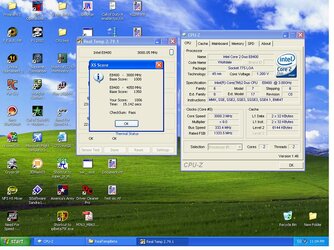Thanks for the tests fellas, just come across this... but you still haven't resolved this issue and we're waiting.

On Intel platforms, MB MFGs have long tweaked the MCH tighter or looser as per offering oc abilities. For whatever reason, this doesn't just affect MEM access figures. Any direct CPU latency comparison between two different CPU and MB models will not be immediately valid due to this reason. Unless you can do the following...
You have to, at the very least for comparison reasons, keep the settings seen in MEMSET all the same on the same OS, using the same speeds/timings/multipliers and then bench using the same benchmark version - minimal differences and removes all doubt. Bandwidth and hence latency is not just a function of L1/L2 cache access rates by some of these apps, if it was, they wouldn't differ in their calculation results with such variance.
I'm curios to see L1/L2 access numbers. Sandra, CPU-Z Latency and Everest are conclusive and accurate enough if you can keep additional factors fixed. wPrime is another consistent and good application to check on a CPU's underlying potential, far superior to the inconsistent SPi/3DM. Gaming would make an appropriate topping.
The Sandra test was well done and the first thing that had me piqued apart from this part - if you can run them keeping all latency and bandwidth affecting factors constant, then you'll have good enough reason to make a conclusion. As of yet, its still up in the air.
Can you show proof of this? I find it hard to believe.
Its not possible under Windows. The difference between the 3G 9850 to a 3.85G Q6600 is roughly clock linear in 3DM'06 CPU since they are very close per clock cycle in it. If you keep the NB on the K10 stock and tRD normal, it'll trail about 100 points per clock (apart from in x64). If you tighten K10 tRD and NB, it comes on par to a few ahead per clock even at 6x 400FSB PL4.




 Your memory timings shouldn't effect L2 bandwidth but I'll give it a try at 500x8 with CL5 timings.
Your memory timings shouldn't effect L2 bandwidth but I'll give it a try at 500x8 with CL5 timings.
